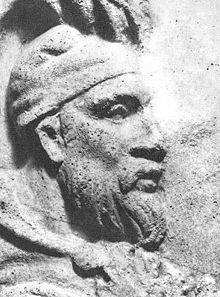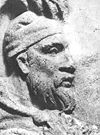- Decebalus
-
"Decebal" redirects here. For the village in Soroca district, Moldova, see Tătărăuca Veche. For the village in Satu Mare County, Romania, see Vetiş.
Decebalus or Diurpaneus King of Dacia 
Decebalus, from Trajan's ColumnReign 87–106 A.D. Died 106 Predecessor Duras Father Scorilo Decebalus or "The Brave" (originally named Diurpaneus)[1] was a king of Dacia (ruled the Dacians 87–106)[2] and is famous for fighting three wars and negotiating two interregnums of peace[2] without being eliminated[3] against the Roman Empire under two emperors.[1] In the later short peace (end of 102-105) granted by Trajan, Decebalus continued to act as an independent king,[4] rather than a conquered client and repeatedly annoyed or infuriated the Romans.
Consequently, the Legions under Trajan's orders went on the offensive again in 105 AD, reducing the Dacian capital Sarmizegetusa in 106.[4] After that, Decebalus committed suicide.
Contents
Recent history preceding
After the death of Great King Burebista, Dacia split into four then five smaller states. The situation lasted until Diurpaneus managed to consolidate the core of Dacia around Sarmizegetusa, in today's Hunedoara county. Though not yet king, he reorganized the Dacian army, which in 85 began minor raids upon the heavily fortified Roman province of Moesia, located south of the Danube under Dacian king Duras.
In 86, the Duras ordered a more vigorous attack south into Roman province of Moesia. Emperor Domitian personally advanced into the province with legions and relief supplies, reorganized it, and planned an attack into Dacia the next campaign season. It did not turn out well.
War against Emperor Domitian
Main article: Domitian's Dacian WarIn 87, Emperor Domitian sent his prefect of the Praetorian Guards, Cornelius Fuscus, to punish the Dacians. His four or five legions suffered a major defeat when ambushed by the forces of Diurpaneus.[1] Two Roman legions (among which was the V Alaudae) were ambushed and defeated at a mountain pass the Romans called Tapae (widely know as the Iron Gates along what is the modern Romania-Serbia border). Fuscus was killed. Diurpaneus dubbed himself Decebalus, meaning "with the strength of ten [men]"[5] or simply "The Brave,"[1] and was crowned king.
Enemy's eye view
Regarding the Domitian wars Dio Cassius described Decebalus as follows:
“ At this time the Romans became involved in a very serious war with the Dacians, whose king was then Decebalus. This man was shrewd in his understanding of warfare and shrewd also in the waging of war; he judged well when to attack and chose the right moment to retreat; he was an expert in ambuscades and a master in pitched battles; and he knew not only how to follow up a victory well, but also how to manage well a defeat. Hence he showed himself a worthy antagonist of the Romans for a long time. I call the people Dacians, the names used by the natives themselves as well as by the Romans, though I am not ignorant that some Greek writers refer to them as Getae, whether that is the right form or not; for the Getae of whom I myself know are those that live beyond the Haemus range, along the Ister.[6] ” In 88, Tettius Iulianus commanded another Roman army under Domitian against the Dacians, who defeated the Romans at the Second Battle of Tapae. Since German revolts along the Rhine were requiring augmented military force in Moesia, the Romans were compelled to pay large sums in tribute to the Dacians for maintaining peace. This humiliating situation lasted until Trajan became Emperor in 98. Immediately he began preparations for wars that would expand the Roman Empire to its maximum extent.
Wars against Emperor Trajan
Main article: Trajan's Dacian WarsFirst war (101-102)
Decebalus was defeated by the Romans when they invaded Dacia beginning March 25, 101 AD,[7] again in the fortifications of Tapae. After accepting harsh peace conditions including losses in territory,[3] he was left as a client king under a Roman protectorate and a small local garrison.
Second war (105-106) - The fall of Dacia
Main article: Battle of SarmizegetusaThree years later, Decebalus destroyed the small Roman garrison in Dacia, and the Romans were forced again to send reinforcements, and this time Trajan decided to definitively conquer Dacia.
After a long siege of the Dacian Capital, Sarmizegetusa and a few skirmishes in the greater region, the Romans conquered Dacia. Decebalus managed to escape with his family.
Death of Decebalus
 Decebalus' suicidal death, from Trajan's Column
Decebalus' suicidal death, from Trajan's Column
Hunted, having his army defeated and finally cornered by Roman detachments seeking his head, rather than being captured to be exhibited and humiliated at Rome, Decebalus committed suicide by slashing his own throat, as depicted on Trajan's Column (spiral 22, panel b).
It is likely, however, that in the process of dying, Decebalus was captured by a Roman cavalry scout named Tiberius Claudius Maximus from Legio VII Claudia as is claimed on the funerary stele discovered at Gramini in Greece. His head and right hand were then taken to Trajan in "Ranisstorium" (an unidentified Dacian village, perhaps Piatra Craiului) by Claudius Maximus when he was decorated by the emperor, and the trophy sent to Rome where it was thrown on the Gemonian stairs.[8] Tiberius Claudius Maximus' tomb cites two occasions where the legionary was decorated for his part in the Dacian wars, one of which being the acquisition and recovery of Decebalus' head.[9]
Legacy of Decebalus
Decebalus is considered a national hero in Romania and has been portrayed in numerous literary works, movies (e.g. Dacii, directed by Sergiu Nicolaescu), sculptures, etc. His first known portrait has been preserved on Trajan's Column, the commemorative stone column completed in 113. Trajan's Column depicts the key moments of the last two wars between Dacia and the Roman Empire in carved bas relief. During the 1990s, a team of sculptors carved a 40-meter tall statue of Decebalus from a stone outcrop near the city of Orşova, Romania.
See also
- Trajan's Dacian Wars
- Regalianus was, according to Tyranni Triginta, a descendant of Decebalus.
- Decebalus Treasure
- List of Dacian kings
Notes
- ^ a b c d "De Imperatoribus Romanis" (Assorted Imperial Battle Descriptions). An Online Encyclopedia of Roman Emperors. http://www.roman-emperors.org/assobd.htm#t-inx. Retrieved 2007-11-08. "Battle of Sarmizegetusa (Sarmizegetuza), A.D. 105. During Trajan's reign one of the most important Roman successes was the victory over the Dacians. The first important confrontation between the Romans and the Dacians took place in the year 87 and was initiated by Domitian. The praetorian prefect Cornelius led five or six legions across the Danube on a bridge of ships and advanced towards Banat (in Romania). The Romans were surprised by a Dacian attack at Tapae (near the village of Bucova, in Romania). Legion V Alaude was crushed and Cornelius Fuscus was killed. The victorious general was originally known as Diurpaneus (see Manea, p.109), but after this victory he was called Decebalus (the brave one)."
- ^ a b "De Imperatoribus Romanis". http://www.roman-emperors.org/assobd.htm#t-inx. Retrieved 2007-11-08. "In the year 88, the Romans resumed the offensive. The Roman troops were now led by the general Tettius Iulianus. The battle took place again at Tapae but this time the Romans defeated the Dacians. For fear of falling into a trap, Iulianus abandoned his plans of conquering Sarmizegetuza and, at the same time, Decebalus asked for peace. At first, Domitian refused this request, but after he was defeated in a war in Pannonia against the Marcomanni (a Germanic tribe), the emperor was obliged to accept the peace."
- ^ a b "De Imperatoribus Romanis". http://www.roman-emperors.org/assobd.htm#t-inx. Retrieved 2007-11-08. "Although the Dacians had been defeated, the emperor postponed the final siege for the conquering of Sarmizegetuza because his armies needed reorganization. Trajan imposed on the Dacians very hard peace conditions: Decebalus had to renounce claim to some regions of his kingdom, including Banat, Tara Hategului, Oltenia, and Muntenia in the area south-west of Transylvania. He had also to surrender all the Roman deserters and all his war machines. At Rome, Trajan was received as a winner and he took the name of Dacicus, a title that appears on his coinage of this period. At the beginning of the year 103 A.D., there were minted coins with the inscription: IMP NERVA TRAIANVS AVG GER DACICVS."
- ^ a b "De Imperatoribus Romanis". http://www.roman-emperors.org/assobd.htm#t-inx. Retrieved 2007-11-08. "However, during the years 103-105, Decebalus did not respect the peace conditions imposed by Trajan and the emperor then decided to destroy completely the Dacian kingdom and to conquer Sarmizegetuza."
- ^ "Decebalus" means "strong as ten [men]" (cf. Sanskrit daśabala); Dece- being derived from Proto-Indo-European *dekm- ('ten') and -balus from PIE *bel-, 'strong'. Cf. Proto-Albanian *dek(a)t-, from PIE *dekm- (Demiraj, 1999).
- ^ Dio Cassius http://penelope.uchicago.edu/Thayer/E/Roman/Texts/Cassius_Dio/67*.html
- ^ "Battle of Sarmizegetusa (Sarmizegetuza), A.D. 105". http://www.roman-emperors.org/assobd.htm#t-inx. "Because the Dacians represented an obstacle against Roman expansion in the east, in the year 101 the emperor Trajan decided to begin a new campaign against them. The first war began on 25 March 101 and the Roman troops, consisting of four principal legions (X Gemina, XI Claudia, II Traiana Fortis, and XXX Ulpia Victrix), defeated the Dacians."
- ^ M Spiedel - JRS 60 page 142-153
- ^ "Julian Bennett -Traian
References
- "Assorted Imperial Battle Descriptions", De Imperatoribus Romanis.
- Speidel, M. (1984), Roman Army Studies, pp. 173–187.
External links
Dacia topics Dacian tribes: Aedi · Albocense · Anartes · Apuli · Artakioi · Biephi · Biessoi · Buri · Carpi · Cauci · Ciaginsi · Clariae · Costoboci · Cotini · Crobidae · Daci · Getae · Moesi · Osi · Peukini · Piephigi · Potulatense · Predasense · Rhadacense · Saldense · Scaugdae · Sense · Suci · Terizi · Teurisci · Trixae · Tyragetae · Troglodytae
Dacian kings: Culture and civilisation: Art, jewellery, treasures, tools (Bracelets) · Clothing · Foreign Relations (Greeks · Celts · Romans · Germanic tribes) · Warfare (Falx · Sica · Thracian warfare)
Sarmizegetusa · Argidava · Buridava · Cumidava · Piroboridava · Sucidava · More towns... · Davae · Dacian Fortresses of the Orăştie Mountains · Murus dacicusWars with the
Roman Empire:Roman Dacia: Dacia Traiana · Moesia · Scythia Minor · Dacia Aureliana · Diocese of Dacia · Dacia Mediterranea · Dacia Ripensis · Trajan (Bridge · Column) · Towns and cities · Castra · Limes (Alutanus · Moesiae · Porolissensis · Sarmatiae · Transalutanus · Trajan's Wall · Brazda lui Novac) · Language (Thraco-Roman · Eastern Romance substratum)Research on Dacia: Books on Dacia · Dacian archaeology · Archaeological sites in Romania · Dacology · Thracology · ProtochronismWikiProject • Commons • Dacian fortresses, settlements, Roman castra, limes from Romania: Google Maps • Google Earth Categories:- Dacian kings
- Suicides by sharp instrument
- 106 deaths
- 1st-century monarchs in Europe
- 2nd-century monarchs in Europe
- Dacian names
Wikimedia Foundation. 2010.

